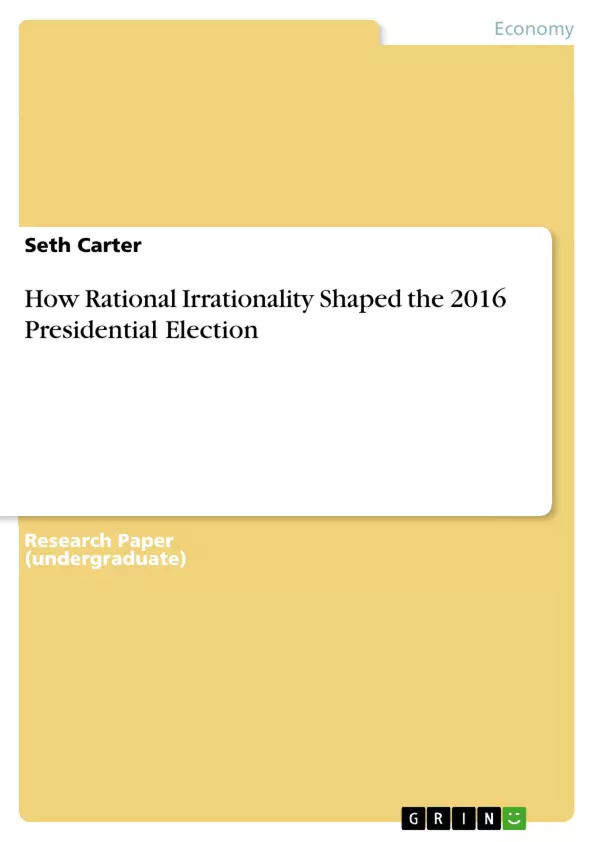This paper seeks to establish evidence for the existence of systematic irrationality in the democratic voting of the 2016 United States Presidential election. From results of some of the key movements and deviations during the electoral process, the electoral victory of President Donald Trump is scrutinized under the theoretical lens of Brian Caplan's theory of rational irrationality and found to offer empirical support. Furthermore, the paper seeks to investigate the possible regulatory policy implications of elected officials chosen on the basis of systematic bias and determine their possible impact.
Inhaltsverzeichnis (Table of Contents)
- I. Introduction
- A. The topic of this paper concerns the unusual electoral outcomes of the 2016 United States presidential election and explores a theoretical model for the causes as well as possible effects of the election on regulation.
- B. The concept of the systematic failure of democracy analyzed from an economic standpoint is not new.
- C. Responses to rational ignorance as an explanation for electoral outcomes and the subsequent policies that arise prominently include the Miracle of Aggregation.
- D. This paper chooses to utilize Brian Caplan's theory of rational irrationality precisely because it circumvents these objections and explains democratic failures or seemingly irrational electoral outcomes as not because voters are ignorant or deceived, but precisely because they receive the things that they tend to want.
- II. Topic Background
- A. The most significant and to many, surprising, consequence of the 2016 presidential election was the victory of Donald Trump, who managed to successfully defy Republican Party establishment figures while espousing rhetoric containing a strong anti-immigration as well as anti-free trade bias.
- III. Theoretical Analysis
- A. Caplan's theory of rational irrationality lends itself to the analysis of the 2016 election by explaining voter behavior not as a result of classical rational ignorance, but by empirically arguing for the existence of pervasive and irrational cognitive biases that are bound to affect the direction of voter behavior in the aggregate.
- B. The effects of policies instituted by politicians elected by means of rational irrationality extend somewhat beyond the scope of Caplan's theory.
Zielsetzung und Themenschwerpunkte (Objectives and Key Themes)
This paper examines the 2016 United States presidential election and investigates the existence of systematic irrationality in democratic voting. The paper explores the theoretical framework of rational irrationality proposed by Brian Caplan to explain the unexpected election outcomes, particularly the victory of Donald Trump. Furthermore, the paper examines the potential policy implications of elected officials chosen on the basis of systematic bias and its impact on economic regulations.
- Rational irrationality as an explanation for electoral outcomes
- Systematic irrationality in democratic voting
- Impact of irrational beliefs on voter behavior
- Policy implications of elected officials chosen on the basis of irrational biases
- The role of regulation in the context of rational irrationality
Zusammenfassung der Kapitel (Chapter Summaries)
The introduction delves into the unusual electoral outcomes of the 2016 presidential election and explores a theoretical model for the causes and effects of the election on regulation. It discusses existing literature on rational ignorance, which argues that voters are rationally uninformed due to the low probability of their vote influencing the outcome. However, the paper argues that Caplan's theory of rational irrationality offers a more comprehensive explanation.
The second chapter provides background information on the 2016 election, highlighting the surprising victory of Donald Trump and his anti-immigration and anti-free trade rhetoric.
The third chapter delves into the theoretical analysis of rational irrationality. It explains Caplan's theory, distinguishing between epistemic and instrumental rationality and arguing that individuals may rationally choose to hold irrational beliefs. The chapter also discusses the implications of rational irrationality for voting behavior and how it can influence policy outcomes.
Schlüsselwörter (Keywords)
Rational irrationality, systematic irrationality, democratic voting, 2016 US Presidential election, voter behavior, policy implications, regulation, economic regulations, cognitive biases, epistemic rationality, instrumental rationality.
Frequently Asked Questions
What is the theory of "rational irrationality"?
Proposed by Brian Caplan, it suggests that voters hold irrational beliefs not because they are ignorant, but because it is "rational" for them to satisfy their emotional or cognitive biases when the individual cost of their vote is low.
How does this theory explain Donald Trump's 2016 victory?
The paper argues that Trump's victory was supported by systematic voter biases, such as anti-immigration and anti-free trade sentiments, which align with Caplan's model of irrational voter behavior.
What is the "Miracle of Aggregation"?
It is a concept often used to defend democracy, suggesting that random errors by uninformed voters cancel each other out, leaving a rational collective choice. Caplan’s theory challenges this by arguing that biases are systematic, not random.
What are the policy implications of rational irrationality?
Politicians elected through systematic bias may implement economic regulations and policies that reflect those irrational beliefs, potentially harming overall welfare.
What is the difference between epistemic and instrumental rationality?
Epistemic rationality is about seeking the truth, while instrumental rationality is about choosing the best means to achieve one's goals, which might include holding onto comforting but false beliefs.
- Citation du texte
- Seth Carter (Auteur), 2018, How Rational Irrationality Shaped the 2016 Presidential Election, Munich, GRIN Verlag, https://www.grin.com/document/429679



